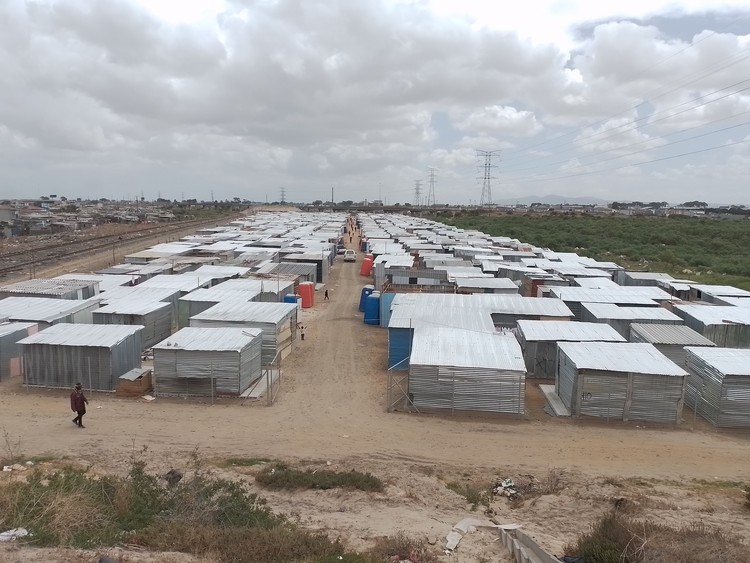PRASA relocation of railway line occupiers was illegal, claims City of Cape Town
Parliament hears that City issued a contravention notice to rail agency, despite being part of relocation discussions
People who occupied the railway line in Philippi and Nyanga, Cape Town, have been relocated by PRASA to this site alongside Stock Road train station in Philippi East. But the City says the land is not zoned for human habitation. Archive photo: Sandiso Phaliso
- Hundreds of people who occupied the railway line in Philippi and Nyanga, Cape Town, were relocated to a site along Stock Road in Philippi East by PRASA in December.
- But on Tuesday the City of Cape Town told Parliament’s Standing Committee on Public Accounts that the land needed to be rezoned for human habitation.
- As a result, PRASA faces a potential R800,000 fine.
- PRASA has applied for a 60-day extension until 22 March to submit the rezoning application.
PRASA’s relocation of households from the railway reserve in Nyanga and Philippi to land next to the Philippi Stock Road train station in December was illegal as the land is not zoned for human habitation.
This emerged during a follow up meeting on the relocation before Parliament’s Standing Committee on Public Accounts (SCOPA) on Tuesday.
Efforts to relocate thousands of families which occupied parts of the Metrorail Central Line in Cape Town during Covid lockdown, have been presented to SCOPA since at least April last year.
The intergovernmental effort, dubbed Operation Bhekela, to relocate households in order to reopen the entire Central Line, has been marked by several delays and disputes.
On Tuesday, MPs were told that although the first of 891 households were moved to the Stock Road site on 7 December, the City of Cape Town issued a contravention notice to PRASA on 22 December, citing unlawful conduct, as prior approvals for the temporary housing on the land owned by PRASA had not been sought.
As a result, PRASA faces a potential R800,000 fine.
Cape Town deputy mayor Eddie Andrews told SCOPA that PRASA had flouted the City’s bylaws and is required to submit a town planning application for the change in use of the land from transport zoning to residential use.
PRASA acting CEO Hishaam Emeran told SCOPA the initial deadline given for the rezoning application was 22 January, but they had applied for a 60-day extension until 22 March.
Emeran said PRASA has since sought the services of a town planner to assist in compiling the land use application.
He said he was taken aback by the contravention notice as the City was aware of the relocation process, which involves a number of state actors, including the City.
“It seems the City’s development planning department was not informed of Operation Bhekela, hence the notice,” said Emeran.
Andrews told SCOPA it was important that PRASA apply for the change in zoning because it was “a new site”.
“It is land that is inappropriately zoned. There must be a rezoning application and a plan submitted to council,” said Andrews.
After the meeting, Andrews told GroundUp that PRASA as the landowner “has the obligation to comply with the bylaw and at no stage was such exemption granted under the provisions of the bylaw”.
SCOPA chairperson Mkhuleko Hlengwa said it was expected that as the City was signatory to the Operation Bhekela implementation protocol, all the technical and legal issues should have been discussed at stakeholders’ meetings.
“Having been part of the implementation protocol these issues will be raised there. Is the City now issuing a notice on itself as it is part of the implementation protocol? Were these matters not part of the discussions?” asked Hlengwa.
Earlier this month, households relocated to the Stock Road site protested over a lack of basic services from the City, including the provision of water, electricity, and sanitation.
Next: Soweto households without electricity for seven months
Previous: Hundreds of eThekwini municipal workers march for higher wages
© 2024 GroundUp. This article is licensed under a Creative Commons Attribution-NoDerivatives 4.0 International License.
You may republish this article, so long as you credit the authors and GroundUp, and do not change the text. Please include a link back to the original article.
We put an invisible pixel in the article so that we can count traffic to republishers. All analytics tools are solely on our servers. We do not give our logs to any third party. Logs are deleted after two weeks. We do not use any IP address identifying information except to count regional traffic. We are solely interested in counting hits, not tracking users. If you republish, please do not delete the invisible pixel.



